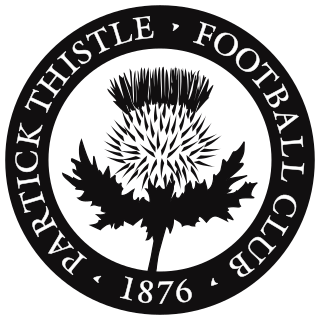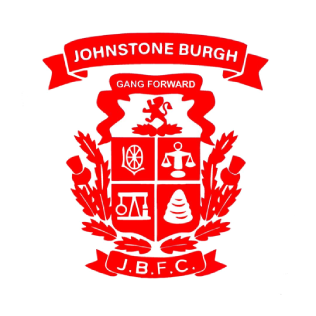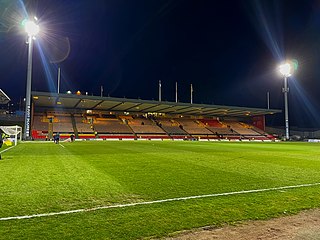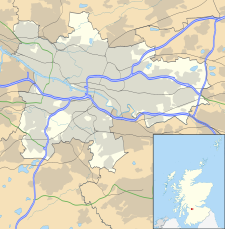
Partick Thistle Football Club are a professional football club from Glasgow, Scotland. Despite their name, the club are based at Firhill Stadium in the Maryhill area of the city, and have not played in Partick since 1908. The club have been members of the Scottish Professional Football League (SPFL) since its formation in 2013, having previously been members of the Scottish Football League. In the 2020–21 season, Thistle won Scottish League One, the third tier of the SPFL structure, and returned to the Scottish Championship, having been relegated from there in 2019–20.

Johnstone Burgh Football Club is a Scottish football club based in Johnstone, Renfrewshire, and play in West of Scotland League First Division.

Erskine is a town in the council area of Renfrewshire, and historic county of the same name, situated in the West Central Lowlands of Scotland. It lies on the southern bank of the River Clyde, providing the lowest crossing to the north bank of the river at the Erskine Bridge, connecting the town to Old Kilpatrick in West Dunbartonshire. Erskine is a commuter town at the western extent of the Greater Glasgow conurbation, bordering Bishopton to the west and Renfrew, Inchinnan, Paisley and Glasgow Airport to the south. Originally a small village settlement, the town has expanded since the 1960s as the site of development as an overspill town, boosting the population to over 15,000. In 2014, it was rated one of the most attractive postcode areas to live in Scotland.

Firhill Stadium, also known as Wyre Stadium at Firhill for sponsorship reasons, is a football and former rugby union, rugby league and greyhound racing stadium located in the Maryhill area of Glasgow, Scotland which has been the home of Partick Thistle since 1909.

Whiteinch is an area in the city of Glasgow, Scotland. It is situated directly north of the River Clyde, between the Partick and Scotstoun areas of the city. Whiteinch was at one stage part of the burgh of Partick, until that burgh's absorption into the expanding city of Glasgow in 1912, and part of the Parish of Govan.

Sauchiehall Street is one of the main shopping streets in the city centre of Glasgow, Scotland, along with Buchanan Street and Argyle Street.

The 1877–78 Scottish Cup – officially the Scottish Football Association Challenge Cup – was the fifth season of Scotland's most prestigious football knockout competition. For the first time, over 100 teams took part in the competition which began with the first round on 22 September 1877. The cup was won by Vale of Leven for a second time after they defeated Glasgow club 3rd Lanark RV 1–0 in the final on 30 March 1878.

George V Bridge is a three-arched road bridge over the River Clyde in the city centre of Glasgow, Scotland, named after King George V.

The 1878–79 Scottish Cup – officially the Scottish Football Association Challenge Cup – was the sixth season of Scotland's most prestigious football knockout competition. Defending champions Vale of Leven met Rangers in the final but, after a 1–1 draw in the original match on 19 April 1879, the replay was scratched and Vale of Leven were awarded the cup. Rangers objected to a goal being disallowed in the original match and refused to play the replay.

The 1887–88 Scottish Cup was the 15th season of Scotland's most prestigious football knockout competition. Renton won the competition for the second time after they beat Cambuslang 6–1 in the final. The result set a new record as the largest margin of victory in a Scottish Cup Final - a record that was equalled by Celtic in 1972 but has never been bettered.
John Jackson was a Scottish professional footballer who played as a goalkeeper; he made over 300 appearances in the Scottish League playing for Partick Thistle and the English Football League for Chelsea. in 1930s

Melville Dundas was a major Scottish construction company.
Inchview was a football ground in the Whiteinch area of Glasgow, Scotland. It was the home ground of Partick from the 1870s until 1885, and of Partick Thistle from 1885 until 1897.

Founded in 1883, the Glasgow Football Association, based in the city of Glasgow, Scotland and affiliated to the national Scottish Football Association, is one of the oldest such bodies in football. In the modern game its influence is limited, the remit being "to represent the interests of the senior football clubs in Glasgow". Those senior clubs competing across the divisions in the Scottish Professional Football League include the two largest and most successful in the country by some distance, Celtic and Rangers, as well as Partick Thistle, Queen's Park and Clyde ; the three smaller clubs exist in the shadow of their dominant neighbours. A sixth team, Third Lanark, had a strong record until their sudden collapse in the mid 1960s.
David Hogg Ness was a Scottish footballer who played as an outside right; his only club at the professional level was Partick Thistle, where he spent twelve seasons, making 423 appearances for the Jags in all competitions and scoring 97 goals.
Edward McCormick McLeod was a Scottish footballer who played as a left half; his only club at the professional level was Partick Thistle, where he spent thirteen 'normal' seasons, and was also on the books during the unofficial World War II campaigns, making 495 appearances for the Jags in all competitions and scoring 7 goals. He played for the club in the 1930 Scottish Cup Final which they lost to Rangers after a replay, but did manage to claim winner's medals in the Glasgow Merchants Charity Cup in 1927 and the one-off Glasgow Dental Hospital Cup in 1928, both against the same opponents, followed later by a Glasgow Cup in 1934.
Alexander Lambie was a Scottish footballer who played as a centre half.
Stewart Calderwood was a Scottish footballer who played as a full back ; his only club at the professional level was Partick Thistle, where he spent twelve seasons, making 420 appearances for the Jags in all competitions and scoring 9 goals. He was on the books for a thirteenth year without playing before signing provisionally with Queens Park Rangers in England on a free transfer, aged 33; however, the outbreak of World War II meant he never made a competitive appearance for the West London club. He served in the Royal Air Force during the conflict.
George Boardman was a Scottish professional footballer who played for Partick Thistle, Bradford and Nairn County, mainly as an inside forward although he also featured at centre half and centre forward.
The Glasgow Dental Hospital Cup was a one-off football tournament held in Glasgow, Scotland over several dates in November and December 1928 with the purpose of raising funds for the Glasgow Dental Hospital and School which had a new building under construction in the city centre.












